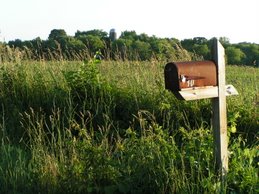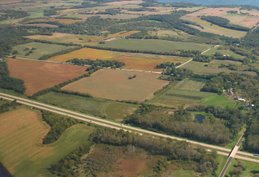By RICH EGGLESTON
It's only coincidence that communities across Wisconsin are required to have their much vaunted comprehensive plans completed not long after the last SUV rolls off the General Motors assembly line in Janesville.
But it's no coincidence at all that our best efforts to map our future via comprehensive planning could end up just as ungainly a dinosaur tomorrow as the Chevy Suburbans that made big money for GM in the era of $1.15 a gallon gasoline.
That's because we're drafting plans for a future that threatens us with $4, $5 or $6 a gallon gasoline under parameters established by the state when gas was $1.15 a gallon.
By the time most communities even thought about comprehensive plans, gas was heading toward $2 a gallon and urban density was still the poor stepchild of development. It never got invited to the ball.
At $6 a gallon, density might be the life of the party. But government is a dinosaur all its own, and a lot of time and effort has been invested in planning for a future of $2 a gallon gas. We have to shift gears, and fast.
Written only 10 years ago, the comprehensive planning law uses terminology that today is outdated as a roadmap to the future. It tells us to plan for transportation and utilities but doesn't say a word about climate change, energy conservation or sustainability.
As a result, we're driving full speed ahead into the past, and our brakes are bad. Fitchburg approved marvelous developments that were well suited to $2 a gallon gasoline. But as the words "subprime mortgage" entered the vernacular, miniature mansions for the masses still rose on Fitchburg's skyline.
The surest way to ease the pinch of high energy prices is to reduce energy consumption. Make the kids walk or bike to soccer practice. Pick up the phone instead of the car keys. Take a train or bus. Let's design our community to make those things easy to do instead of almost impossible.
Around the country, transit saves 3.4 billion gallons of fuel each year, saves us 541 million hours that otherwise would be spent in traffic jams and cuts greenhouse gas emissions by 26 million tons.
According to USA Today, Americans drove 22 billion fewer miles from November through April than during the same period in 2006-07. We are doing it.
And it's happening in a society that until yesterday was transit unfriendly. At $4 a gallon, it might be possible to get people out of their cars without prying their cold, dead hands off the steering wheels. At $6 a gallon, it's a sure thing.
As Fitchburg finalizes our comprehensive plan, we must plan to do more with less energy. If we don't, we'll have a community that is just as well suited to the future as a bunch of ungainly dinosaurs are suited to the 21st century.
And we're going to have to settle for a lot less in terms of quality of life and economic growth as a result.
Monday, July 14, 2008
Fitchburg is planning for the past
Posted by
Terry Carpenter
at
10:30 PM
0
comments
![]()
Categories Carbon Emissions, Comprehensive Plan, Sustainability, Transportation
Sunday, September 9, 2007
Calling All Localvores
Localvore -- A person committed to eating foods grown within their local food shed. (No, not a building!)

Fresh, locally grown food doesn’t just taste delicious, it can be better for our health, for our communities, for the Earth. When we eat locally grown food we support local farmers and our own community. The challenge is to have at least 10% of our food be local during the 10 days September 14 - 23. Go to http://www.cias.wisc.edu/eatlocal to register or for more information.
What is “local”?
Posted by
Terry Carpenter
at
12:15 PM
1 comments
![]()
Categories Carbon Emissions, Local Food, Sustainability
Tuesday, August 14, 2007
Downshift Your Driving
According to the Carbon Conscious Consumer (C3), "It takes total carbon dioxide emissions from most countries worldwide combined to equal just vehicle emissions in the United States, and as we consume more and more gas, pressure builds to drill in fragile and conflict-ridden areas. Yet a quarter of the trips Americans make are within walking distance, and each American driver could keep nearly a thousand pounds of carbon dioxide out of the air by taking the Carbon Conscious Consumer pledge to find an alternative to driving only one day each week. With gas prices so high, now is a great time to start reducing our reliance on cars."
Gas prices. Carbon emissions. Traffic. Three good reasons to join in pledging to reduce our driving each month through December. If we keep the car in the driveway one day each week in August, each gallon of gas that goes unused keeps twenty pounds of carbon dioxide out of the atmosphere.
I work from home so it's not about commuting for me. But, there are plenty of times when I really don't need to run that errand or I could take my bike instead of the car. And with some common sense (and a pinch of planning) I can easily combine errands in one trip. In fairness, I'd have to leave my car home 3 days a week to be much of a challenge so I'll commit to that.
Like many of you, I don't live in the most walker/biker-friendly area. The closest business, about 1 mile away, is ...(drum roll)... a gas station. Sadly, when nothing else is within walking distance, gas stations emerge. You can assess your neighborhood's "greenness" with the online evaluation tool Hans Noeldner recommended at http://www.walkscore.com/. Although it is not as accurate in a place like the ever-changing Fitchburg, it does help us think about options within walking and biking distance.
Even though I'm not as comfortable as Hans is about riding my bike on some of the local roads without bike lanes (not to mention donning tight black and yellow bike gear--go Hans!), I still have low carbon choices. (Not to be confused with low carb choices but there's certainly a connection since emitting fewer carbons might mean you don't have to watch the carbs. Now there's a win-win solution!)
Instead of just hoping that the rest of the world won't pick up our bad habits (like hopping into cars when we could walk or wait), doesn't it make sense to set a better, more sustainable, example for the world?
We can all contribute in our own ways. Do you have any ideas to share?
Posted by
Terry Carpenter
at
4:00 PM
0
comments
![]()
Categories Carbon Emissions, Sustainability
Monday, July 30, 2007
Take the Local Produce Pledge
I found this reminder of how important it is to buy locally grown food on the New American Dream website. This month's Carbon Conscious Consumer (C3) pledge is "Buy 1 Pound of Locally Grown Food a Week." Why? "Because 'going local' is a small step that can lead to big change. Food in the U.S. typically travels 1500 miles and the transportation of conventional food generates five to 17 times more carbon emissions than food grown locally."
After reading the pledge, my first thought was that I wouldn't have to do anything different this week because we are already harvesting more than a pound per person from our garden. But, then I realized that since many of us are fortunate enough to be in this position, it's all the more reason to go beyond the "letter of the law" and embrace the spirit of the pledge. So, I am choosing to take additional steps to reduce food transportation miles and build a stronger local economy this month (and every month).

My pledge: To purchase an extra pound of [insert locally available food item here] at the Fitchburg Farmers' Market each Thursday. I will also connect with some local growers to obtain food each week throughout the winter or to stock up by preserving local foods ahead of time. (See the MACSAC website for info about sharing in the local harvest.)
If each Fitchburger (or Fitchburgian for my vegetarian friends) took the pledge, a mere one pound a week per person reduction in food shipped from California would total over 10 tons of food products each and every week that wouldn't be traveling cross-country!
Less traffic. Less noise. Less road maintenance. Less foreign oil. Less carbon emissions. More money recirculating in the local food/farm economy. More beautiful gardens. More friendships between growers and eaters. Pick your benefit.
Let's take our pies off the freeways and put them back into the sky where they belong!
I need your help. What changes could you make to replace one pound of food each week for each person in your household with locally grown food?
Posted by
Terry Carpenter
at
12:30 PM
0
comments
![]()
Categories Carbon Emissions, Local Food


